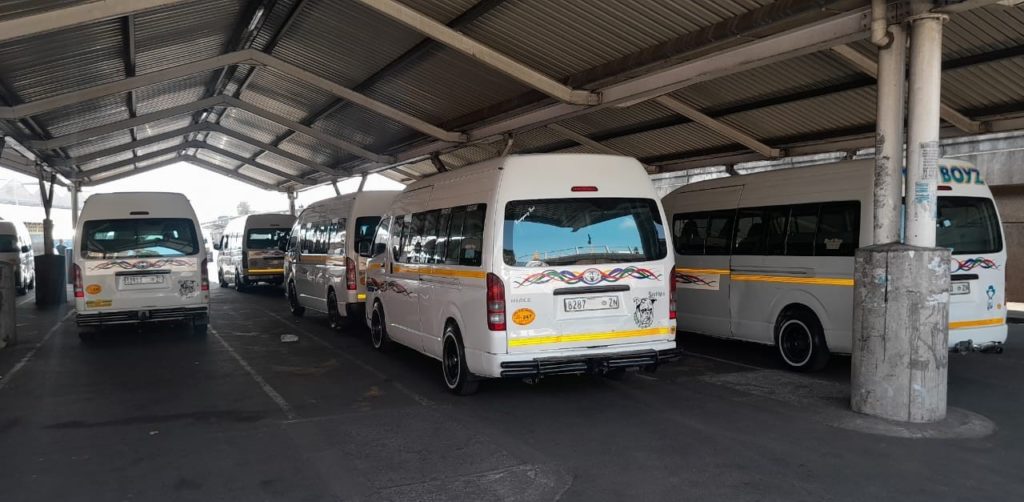By Nonhlakanipho Magwaza
The road bullies throw a tantrum, and everything comes to a screeching halt in the country. The government runs around like headless chickens to try to soothe their tempers. Our government has created a monster by dragging its feet in regulating the mini-bus taxi industry.
A glimpse into safe driving around Durban CBD
Driving along the M4 in Durban, making my way to work on Thursday, 4 September, was such a blissful, stress-free experience. When I got into town, traffic was moving freely with no sudden braking, no one banging their doors followed by shouting or mini-bus taxis driving too close to my taillights, nor suddenly cutting in front of me out of nowhere.
Why? Because the government’s problem child was throwing yet another tantrum. The KwaZulu-Natal (KZN) Department of Transport’s Operation Shanela and the eThekwini Municipality had taken their toys, or rather mini-bus taxis, and impounded them over permits. Although other road users were enjoying the freedom, over a thousand commuters were left stranded. Well, at least this time around the strike was peaceful.
In a previous strike, in 2024, long-distance mini-bus taxi drivers barricaded the streets over permits, causing chaos on the roads. Taxi bosses came to loggerheads with KwaZulu-Natal police commissioner Nhlanhla Mkhwanazi, who threatened to fight fire with fire, to which they retreated, and order was restored. This time around, the strike was peaceful.
In South Africa, the mini-bus taxi industry has long been a source of annoyance for authorities, other transportation providers, and commuters. Due to inadequate regulation, mini-bus taxi drivers have turned into street bullies who control the industry and keep others out. This suppresses healthy competition in the transport sector in addition to reducing commuters’ options.
An article by Siyabulela Fobosi from the Daily Maverick described the mini-bus taxi industry as “both essential and deadly, a paradox that South Africa has yet to solve”. He further describes the violence on our roads as a reflection of “the country’s struggles with inequality, state weakness, and the legacy of apartheid.”
Where the problems originate
The absence of regulation in South Africa’s mini-bus taxi industry is one of its primary problems. This has made it possible for mini-bus taxi drivers to operate without repercussions, which has resulted in careless driving and even violent behaviour towards other drivers. This limits other transport options in addition to making the commuter environment unsafe. Without regulations, the mini-bus taxi industry will continue to dominate the roads, leaving little to no space for other businesses like e-hailing services to prosper.
A few days before the regional strike, tensions flared between the Clermont and KwaDabeka Taxi Association and e-hailing drivers in the area. This is after members of the association allegedly assaulted e-hailing drivers. A shot was also fired at an e-hailing vehicle, which led to 15 mini-bus taxi drivers and owners being taken in for questioning. The KZN Transport Department set up a meeting with the two organisations after the incident. All because the e-hailing drivers were hired by commuters to take them to work, and the association claimed that this is their clientele.
After being reprimanded by both the government and the public, the association threw a tantrum and decided to go on strike over permits and tickets. So basically, the industry wants things done their way or the highway. The absence of clear regulations and oversight has allowed the industry to operate with impunity, prioritising profits over people’s safety and well-being.
Government fails South Africans
The industry’s aggressive strategies have consistently sparked debate about whether regulation is necessary. I believe that an uncontrollable monster has been created by the government’s lack of solid regulation.
In an interview with Newzroom Afrika, a Soweto community leader, Koketso Poho, said the recent tragic incidents where an e-hailing driver was brutally murdered at Maponya Mall highlight the government’s reluctance to regulate the industry, leaving both drivers and commuters vulnerable.
A lack of accountability has also resulted from the absence of regulation. It is challenging to hold mini-bus taxi drivers responsible for any mishaps or accidents on the road because they are not obligated to possess the necessary training or licence. In addition to endangering commuter safety, this gives taxi drivers a sense of entitlement. They think they can act however they want without repercussions, which makes the atmosphere poisonous and hazardous for everyone.
Additionally, the way the South African mini-bus taxi industry functions keeps competitors out of the market. They attempt to eradicate competition by using aggressive and predatory tactics, which leaves commuters with few alternatives. Because it restricts employment opportunities and discourages entrepreneurship, this not only hurts the expansion and innovation of the transport sector but also impedes economic growth.
If you look at the stalled transport project, GO! Durban, which aimed to transform the city’s public transport, was met with resistance from mini-bus taxi operators. Their actions demonstrate a disregard for the greater good and a reluctance to adapt to changing times. Instead of the government finding a solution and standing its ground, they’d rather waste millions of taxpayers’ money to start construction that will later be one of the many white elephants around the city.
The history of the taxi industry and its legacy of operating outside of the official transportation system may be the reason why the government is taking so long to regulate it, according to a 2016 study published in the South African Crime Quarterly, the minibus taxi industry emerged in the wake of the apartheid government’s policy of economic deregulation, initiated in 1987. Black mini-bus taxi drivers had to fight apartheid laws and stringent regulations that discriminated against them.
In an interview with the SABC during the clash between the mini-bus taxis and e-hailing drivers, KZN Transport spokesperson, Ndabezinhle Sibiya, also mentioned the history of how black people were not allowed to have a transport business but forced their way into a business that now takes up a lion’s share of the transportation industry. So, because of this history, does it mean the government must treat them with kid gloves?
The government must set up regulations and enforce them
The government has unintentionally sparked a power struggle by failing to regulate the sector. Clear regulations and enforcement procedures must be put in place to stop future disputes and guarantee public safety. To solve these problems, government action is essential. A safe and equitable working environment for all parties involved can be guaranteed by effective regulation. It’s time for policymakers to act now and strike a balance between the interests of the public, newcomers, and established mini-bus taxi companies.
Nonhlakanipho Magwaza is a student at Durban University of Technology, studying towards the Bachelor of Journalism Honours degree. The views in this opinion piece are expressed in her personal capacity.


